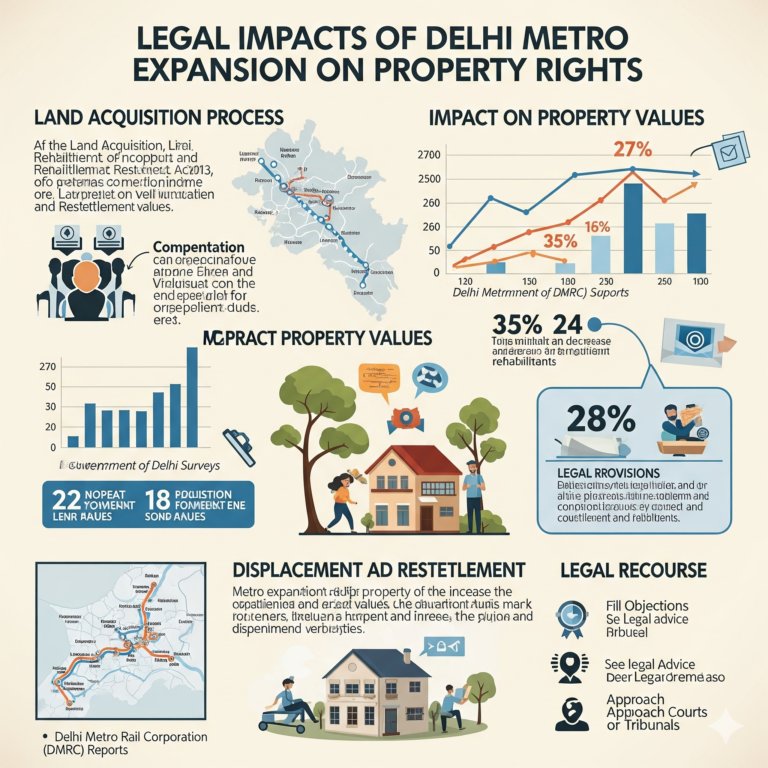The Legal Impacts of Metro Expansion on Delhi Property Rights have become a growing concern for thousands of property owners across the capital. With the Delhi Metro constantly expanding to meet the city’s transportation needs, many homeowners, tenants, and business owners are left wondering how these projects affect their legal ownership, compensation rights, and future security.
While the Delhi Metro brings undeniable benefits like reduced traffic congestion and improved connectivity, its expansion often requires land acquisition, demolition of private properties, or changes in property valuation. In such cases, understanding the Legal Impacts of Metro Expansion on Delhi Property Rights is essential to safeguard both ownership and financial interests.
Why Metro Expansion Matters for Property Owners in Delhi
The Delhi Metro is hailed as one of the most successful urban transport projects in India. However, every new phase involves land acquisition, rezoning, or usage restrictions. These changes directly influence the Legal Impacts of Metro Expansion on Delhi Property Rights, making it vital for property owners to know their entitlements.
Metro expansion impacts:
- Residential property owners facing partial land acquisition.
- Commercial shops losing footfall due to access restrictions.
- Tenants dealing with sudden eviction notices.
- Developers forced to adjust projects under new land-use laws.
All of these scenarios highlight the need to analyze the Legal Impacts of Metro Expansion on Delhi Property Rights in depth.
Property Acquisition and Compensation Issues
One of the most critical Legal Impacts of Metro Expansion on Delhi Property Rights involves land acquisition. Under the Land Acquisition Act, authorities can acquire private land for public use. However, disputes often arise over compensation.
Key issues include:
- Whether compensation matches fair market value.
- Delays in payment or disputes regarding valuation.
- Lack of clarity for tenants or leaseholders.
Legal experts often recommend that property owners challenge unfair compensation in court to ensure their rights are protected under the framework of the Legal Impacts of Metro Expansion on Delhi Property Rights.

Effect on Property Valuation
The Legal Impacts of Metro Expansion on Delhi Property Rights also extend to property valuations. Properties near metro stations may see skyrocketing values, while others may decline due to restricted access, noise, or demolition threats.
For example:
- A shop near a new metro exit may gain higher commercial value.
- A home facing demolition for metro construction may face immediate loss.
- This dual effect makes it critical to understand the Legal Impacts of Metro Expansion on Delhi Property Rights from both a legal and financial perspective.
Zoning Changes and Building Regulations
Another area where the Legal Impacts of Metro Expansion on Delhi Property Rights are visible is zoning. Expansion projects often change land use classifications, such as converting residential plots into commercial zones or limiting construction near metro infrastructure.
Common zoning impacts include:
- Restrictions on new construction near metro pillars.
- Reduced Floor Area Ratio (FAR) in certain areas.
- Mandatory government approvals for redevelopment.
These zoning changes emphasize the ongoing Legal Impacts of Metro Expansion on Delhi Property Rights, especially for developers and homeowners.
Tenant Rights During Metro Expansion
While landlords often receive compensation, tenants frequently get overlooked in the Legal Impacts of Metro Expansion on Delhi Property Rights. Eviction notices, sudden displacement, and lack of clarity regarding relocation benefits create legal disputes.
Tenants should:
- Verify if they are eligible for rehabilitation benefits.
- Seek legal counsel for eviction-related issues.
- Document tenancy agreements to strengthen claims.
By addressing these challenges, tenants can better safeguard themselves against the Legal Impacts of Metro Expansion on Delhi Property Rights.
Environmental and Social Implications
The Legal Impacts of Metro Expansion on Delhi Property Rights are not limited to ownership and valuation. They also intersect with environmental and social laws. Metro construction often leads to tree cutting, noise pollution, and dust, which trigger public interest litigations (PILs).
These legal battles further complicate the landscape of the Legal Impacts of Metro Expansion on Delhi Property Rights, forcing courts to balance development with individual rights.
How Property Owners Can Protect Their Rights
To minimize the Legal Impacts of Metro Expansion on Delhi Property Rights, property owners should take proactive steps:
- Keep property documents updated and registered.
- Consult legal experts for land acquisition notices.
- File objections within deadlines under land acquisition laws.
- Negotiate for rehabilitation or relocation benefits.
- Explore legal remedies in the Delhi High Court if compensation is unfair.
These actions empower owners to navigate the Legal Impacts of Metro Expansion on Delhi Property Rights effectively.
Conclusion
The Legal Impacts of Metro Expansion on Delhi Property Rights are far reaching, affecting property owners, tenants, developers, and even communities. While metro expansion is crucial for Delhi’s future, it also brings legal challenges that demand awareness and expert guidance.
By staying informed and seeking professional legal support, property owners can safeguard their interests and ensure fair treatment in the face of rapid urban transformation. The Legal Impacts of Metro Expansion on Delhi Property Rights may be complex, but with the right legal strategy, they can be managed effectively.

Frequently Asked Questions.
They include land acquisition, zoning changes, property valuation shifts, and tenant disputes.
Often compensation is contested, and owners may need legal help to secure market-value settlements.
Yes, but only if they have legal tenancy agreements and meet eligibility requirements.
It depends on location some properties gain value, while others decline.
Owners can file objections and approach the Delhi High Court for fair compensation.
Yes, PILs are often filed due to environmental and social impacts of construction.
